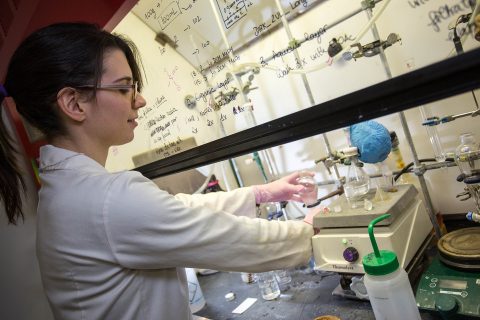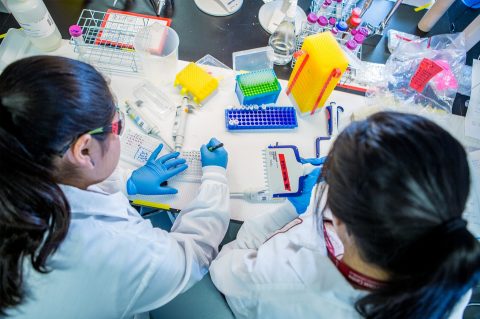Neuroscience (BSc)
Virtual information sessions
Discover what makes Concordia's Faculty of Arts and Science stand out as a leader in the humanities and social and natural sciences, including academic opportunities, hands-on learning and how to achieve your goals.
Why study Neuroscience?
Hormones, steroids and neurotransmitters start pumping through our brains the minute we’re born. Chemicals like adrenalin, cortisol, serotonin and dopamine play key roles in our emotions. When you study behavioural neuroscience, you’ll investigate the links between the chemical changes in the brain, emotions and behaviour.
The Neuroscience option is designed for psychology students who want to research the neurobiology of behaviour. As a student, you’ll follow a core psychology curriculum. You’ll also:
- Receive fundamental training in statistics and research methods
- Study the history of psychology
- Take courses in chemistry, biochemistry and biology
After graduation, you’ll have the skill and knowledge to pursue research, medicine or graduate studies in psychology.
Special funding for out-of-province students
Up to $4000 for undergraduate programs.
Program structure
A Bachelor of Science degree takes a minimum of three or four years (90 – 120 credits) of full-time study, depending on your academic background.
Program options
- Honours in Neuroscience (66 credits)*
- Specialization in Neuroscience (60 credits)
*Honours is a highly concentrated program, ideal for students planning to continue to graduate studies. If you are interested in Honours, speak with your program advisor in your first year of study at Concordia. Students applying to the University are able to apply to the specialization.
Course requirements
United States students: A U.S. Federal Student Aid-eligible version of this program is offered. This version meets all U.S. regulations (such as no co-operative education or e-courses) for eligible programs.
Admission criteria
Minimum cut-off averages and course requirements
- Quebec CEGEP: 27.5
- Calculus 1 and Calculus 2 – Mechanics, Electricity and Magnetism and Wave, Optics and Modern Physics – General Chemistry and Chemistry of Solutions – General Biology OR Natural Science DEC OR DEC intégré en sciences, lettres et arts.
- Additional information for CEGEP applicants
- High School: B overall, B in math / sciences
- Completed courses in the disciplines of Calculus, Biology, Chemistry and Physics.
- One math from Pre-Calculus, Calculus, or equivalent
- Two sciences (from Biology, Chemistry or Physics)
- ACT or SAT is NOT required
- Canadian curricula course requirements
- Accepted international qualifications
- Completed courses in the disciplines of Calculus, Biology, Chemistry and Physics.
- International Baccalaureate (IB) diploma: 29 overall, 4 HL or 5 SL math, 5 science
- one math (Applications and Interpretations HL, Analysis and Approaches HL or Analysis and Approaches SL)
- one science (Physics, Chemistry or Biology, either SL or HL)
- one of the math or science courses must be completed at the HL level
- International Baccalaureate Career-related Programme (CP): 29 overall, 4 HL or 5 SL math, 5 science
- Same as International Baccalaureate Diploma Programme (DP) requirements
- Additional Career-related Programme (CP) course requirements
- Baccalauréat français: 13 overall, 13 in math / science
- Première: Spécialité mathématiques AND Spécialité physique-chimie
Terminale: Spécialité mathématiques (also accepted, Spécialité Physique-Chimie AND Mathématiques Complémentaires)
- Première: Spécialité mathématiques AND Spécialité physique-chimie
- British system of education (GCE):
- A-levels: At least two A-level exams CC, C in math, C in science or
- AS-levels: At least 4 AS-level exams with equivalent results or
- BTEC: Level 3 Diploma or Extended Diploma in a related subject area with equivalent results
- Students without math or science A-levels may be admissible based on AS-level or iGCSE/GCSE/O-Level exam results. Students should include all their exam results from iGCSE (or equivalent) onwards to support their application.
- Additional information for British System of Education (GCE) applicants
- University Transfers (internal/external): B overall, B in math / sciences
- Completed courses in the disciplines of Calculus, Biology, Chemistry and Physics.
Minimum cut-off averages should be used as indicators. The cut-off data may change depending on the applicant pool. Applicants who meet the stated minimum requirements are not guaranteed admission to these programs.
Application deadlines
It’s not too late to apply
Most undergraduate programs are still accepting applications for fall 2025.

FALL ENTRY (September)
Deadline: March 1
International applicants: Apply no later than February 1 to allow time for immigration document processing. However, applying earlier is strongly recommended. Immigration processing times vary by country, and delays could prevent you from starting your studies on time.

WINTER ENTRY (January)
Deadline: November 1
International applicants: Apply no later than August 1 to allow time for immigration document processing. However, applying earlier is strongly recommended. Immigration processing times vary by country, and delays could prevent you from starting your studies on time.
We reserve the right to close admission to a program at any time after the official deadline without prior notice.
Student story

Mara Tartamella
Specialization in Behavioural Neuroscience
Concordia does a great job of offering many opportunities to students, especially in sustainability.
Other programs of interest

As a biochemist, you will study the chemical processes that occur within the cells of living organisms.
Department
Department of Chemistry and Biochemistry
Faculty

Get inspired by life. Immerse yourself in the study of life at all levels: from the edge of biochemistry through cell biology and the physiology of multicellular organisms to the interactions between organisms and their environment.
Department
Faculty

Modern scientific psychology studies brain processes and behaviour — both human and animal — under various conditions.
Department
Faculty


